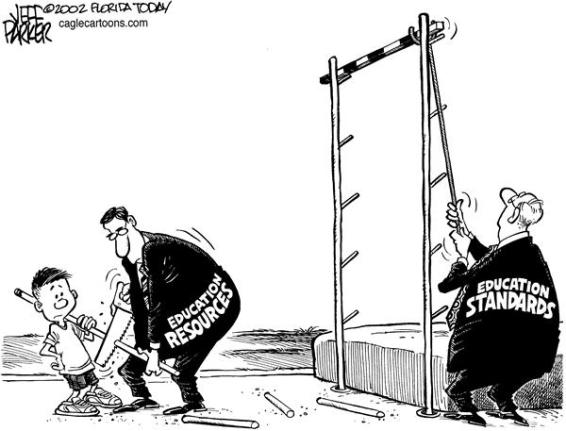Many ed reformers who are not experienced educators don’t understand that The Common Core State Standards are cognitive goals and expectations of student learning or “growth”.
The Standards demand a fixed set of cognitive skills that must be learned and levels of performance that must be achieved by every student each school year regardless of individual circumstance and cognitive ability or disability.
Many reformers don’t understand that standards identify the “college ready” skills that must be acquired by learners and they are not simply bestowed or imparted by teachers.
Our students are not standardized, they possess a wide range of cognitive capabilities and disabilities. These abilities and skills do not emerge and “blossom” at the same rate and in the same way.
Unfortunately, the extra academic assistance and support services that our schools and teachers provide for struggling students, may not be enough to compensate for the absence of learning after school hours.
Many students living in poverty begin their schooling lagging far behind in basic skills and vocabulary development. Many do not participate in after school enrichment activities and informal learning experiences during the summer and other breaks that help to support and advance student achievement in school.
Too often, at-risk students who begin their schooling lagging behind their classmates will actually fall even farther behind and the “gap” will increase as they progress through grade levels because their academic growth is delayed and restrained by numerous barriers to learning.
In effect, our disadvantaged students who are “Racing To The Top” have a much greater academic “distance” to travel to reach graduation performance standards and in many cases they must do this with less academic assistance and resources at home.
The Common Core does very little to ameliorate this problem, because it focuses on the “symptoms” of low achievement in our classrooms rather than the underlying “illness” of poverty in our homes and communities.
It is fanciful to suggest that a steady “diet” or regime of higher academic expectations and standardized tests will address and eliminate the impact of diverse cognitive, social, emotional, and economic factors on student learning in our classrooms.
This approach makes as much sense as a nation raising the daily calorie intake recommendations and recommended weight for all citizens as a way to combat the effects of hunger and famine.
If a student enters school lagging behind other students in academic skills and abilities, he or she could achieve the same amount of academic “growth” as peers but may still be lagging behind in skills at graduation.
With so many students starting school “behind” and living in poverty, it is not prudent or wise to assume the number of first-year college students requiring remedial courses is reliable evidence that K-12 teachers are ineffective and their schools are failing.
It is foolish to spend millions of dollars on software “solutions” and standardized tests that repeatedly measure a narrow and shallow set of hard skills, rather than supporting student learning by using those funds to hire art teachers, librarians, counselors, coaches, nurses, and increase the number of field trips along with work-based learning experiences that actually cultivate student self-efficacy and lifelong learning skills.
The Race To The Top funds would be much better spent if they were used to support job shadowing programs, apprenticeships and internships for all our students so that they spend much less sit and learn class time testing and PREPARING for college and careers and much more work experience time applying and PRACTICING transferable learning and work-based skills.
Any Race To The Top funds that are remaining could be used to solve the “problem” of families having to pay for extra math or ELA college classes by providing Common Core vouchers for 1st year remedial college courses.


